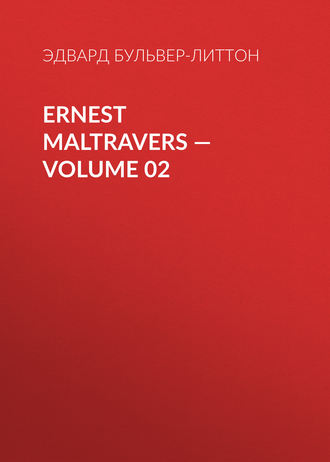
Эдвард Бульвер-Литтон
Ernest Maltravers — Volume 02
"I wish you would see your old country-house; it has a venerable and picturesque look, and during your minority they have let the ivy cover three sides of it. Montaigne might have lived there.
"Adieu, dearest Ernest,
"Your anxious and affectionate guardian,"FREDERICK CLEVELAND.
"P. S.—I am writing a book—it shall last me ten years—it occupies me, but does not fatigue. Write a book yourself."
* * * * *
Maltravers had just finished this letter when Ferrers entered impatiently. "Will you ride out?" said he. "I have sent the breakfast away; I saw that breakfast was a vain hope to-day—indeed, my appetite is gone."
"Pshaw!" said Maltravers.
"Pshaw! Humph! for my part I like well-bred people."
"I have had a letter from Cleveland."
"And what the deuce has that got to do with the chocolate?"
"Oh, Lumley, you are insufferable; you think of nothing but yourself, and self with you means nothing that is not animal."
"Why, yes; I believe I have some sense," replied Ferrers, complacently. "I know the philosophy of life. All unfledged bipeds are animals, I suppose. If Providence had made me graminivorous, I should have eaten grass; if ruminating, I should have chewed the cud; but as it has made me a carnivorous, culinary, and cachinnatory animal, I eat a cutlet, scold about the sauce, and laugh at you; and this is what you call being selfish!"
It was late at noon when Maltravers found himself at the palazzo of Madame de Ventadour. He was surprised, but agreeably so, that he was admitted, for the first time, into that private sanctum which bears the hackneyed title of boudoir. But there was little enough of the fine lady's boudoir in the simple morning-room of Madame de Ventadour. It was a lofty apartment, stored with books, and furnished, not without claim to grace, but with very small attention to luxury.
Valerie was not there, and Maltravers, left alone, after a hasty glance around the chamber, leaned abstractedly against the wall, and forgot, alas! all the admonitions of Cleveland. In a few moments the door opened, and Valerie entered. She was unusually pale, and Maltravers thought her eyelids betrayed the traces of tears. He was touched, and his heart smote him.
"I have kept you waiting, I fear," said Valerie, motioning him to a seat at a little distance from that on which she placed herself; "but you will forgive me," she added, with a slight smile. Then, observing he was about to speak, she went on rapidly; "Hear me, Mr. Maltravers— before you speak, hear me! You uttered words last night that ought never to have been addressed to me. You professed to—love me."
"Professed!"
"Answer me," said Valerie, with abrupt energy, "not as man to woman, but as one human creature to another. From the bottom of your heart, from the core of your conscience, I call on you to speak the honest and the simple truth. Do you love me as your heart, your genius, must be capable of loving?"
"I love you truly—passionately!" said Maltravers, surprised and confused, but still with enthusiasm in his musical voice and earnest eyes. Valerie gazed upon him as if she sought to penetrate into his soul. Maltravers went on. "Yes, Valerie, when we first met, you aroused a long dormant and delicious sentiment. But, since then, what deep emotions has that sentiment called forth? Your graceful intellect—your lovely thoughts, wise yet womanly—have completed the conquest your face and voice began. Valerie, I love you. And you—you, Valerie—ah! I do not deceive myself—you also—"
"Love!" interrupted Valerie, deeply blushing, but in a calm voice. "Ernest Maltravers, I do not deny it; honestly and frankly I confess the fault. I have examined my heart during the whole of the last sleepless night, and I confess that I love you. Now, then, understand me—we meet no more."
"What!" said Maltravers, falling involuntarily at her feet, and seeking to detain her hand, which he seized. "What! now, when you have given life a new charm, will you as suddenly blast it? No, Valerie; no, I will not listen to you."
Madame de Ventadour rose and said, with a cold dignity: "Hear me calmly, or I quit the room; and all I would now say rests for ever unspoken."
Maltravers rose also, folded his arms haughtily, bit his lips, and stood erect, and confronting Valerie rather in the attitude of an accuser than a suppliant.
"Madame," said he, gravely, "I will offend no more; I will trust to your manner, since I may not believe your words."
"You are cruel," said Valerie, smiling mournfully; "but so are all men. Now let me make myself understood. I was betrothed to Monsieur de Ventadour in my childhood. I did not see him till a month before we married. I had no choice. French girls have none. We were wed. I had formed no other attachment. I was proud and vain: wealth, ambition, and social rank for a time satisfied my faculties and my heart. At length I grew restless and unhappy. I felt that something of life was wanting. Monsieur de Ventadour's sister was the first to recommend me to the common resource of our sex—at least, in France—a lover. I was shocked and startled, for I belong to a family in which women are chaste and men brave. I began, however, to look around me, and examine the truth of the philosophy of vice. I found that no woman, who loved honestly and deeply an illicit lover was happy. I found, too, the hideous profundity of Rochefoucauld's maxim that a woman—I speak of French women—may live without a lover; but, a lover once admitted, she never goes through life with only one. She is deserted; she cannot bear the anguish and the solitude; she fills up the void with a second idol. For her there is no longer a fall from virtue: it is a gliding and involuntary descent from sin to sin, till old age comes on and leaves her without love and without respect. I reasoned calmly, for my passions did not blind my reason. I could not love the egotists around me. I resolved upon my career; and now, in temptation, I will adhere to it. Virtue is my lover, my pride, my comfort, my life of life. Do you love me, and will you rob me of this treasure? I saw you, and for the first time I felt a vague and intoxicating interest in another; but I did not dream of danger. As our acquaintance advanced I formed to myself a romantic and delightful vision. I would be your firmest, your truest friend; your confidant, your adviser—perhaps, in some epochs of life, your inspiration and your guide. I repeat that I foresaw no danger in your society. I felt myself a nobler and a better being. I felt more benevolent, more tolerant, more exalted. I saw life through the medium of purifying admiration for a gifted nature, and a profound and generous soul. I fancied we might be ever thus—each to each;—one strengthened, assured, supported by the other. Nay, I even contemplated with pleasure the prospect of your future marriage with another—of loving your wife—of contributing with her to your happiness—my imagination made me forget that we are made of clay. Suddenly all these visions were dispelled—the fairy palace was overthrown, and I found myself awake, and on the brink of the abyss—you loved me, and in the moment of that fatal confession, the mask dropped from my soul, and I felt that you had become too dear to me. be silent still, I implore you. I do not tell you of the emotions, of the struggles, through which I have passed the last few hours—the crisis of a life. I tell you only of the resolution I formed. I thought it due to you, nor unworthy to myself, to speak the truth. Perhaps it might be more womanly to conceal it; but my heart has something masculine in its nature. I have a great faith in your nobleness. I believe you can sympathise with whatever is best in human weakness. I tell you that I love you—I throw myself upon your generosity. I beseech you to assist my own sense of right—to think well of me, to honour me—and to leave me!"
During the last part of this strange and frank avowal, Valerie's voice had grown inexpressibly touching: her tenderness forced itself into her manner; and when she ceased, her lip quivered; her tears, repressed by a violent effort, trembled in her eyes—her hands were clasped—her attitude was that of humility, not pride.
Maltravers stood perfectly spell-bound. At length he advanced; dropped on one knee, kissed her hand with an aspect and air of reverential homage, and turned to quit the room in silence; for he would not dare to trust himself to speak.
Valerie gazed at him in anxious alarm. "O no, no!" she exclaimed, "do not leave me yet; this is our last meeting our last. Tell me, at least, that you understand me; that you see, if I am no weak fool, I am also no heartless coquette; tell me that you see I am not as hard as I have seemed; that I have not knowingly trifled with your happiness; that even now I am not selfish. Your love,—I ask it no more! But your esteem—your good opinion. Oh, speak—speak, I implore you!"
"Valerie," said Maltravers, "if I was silent, it was because my heart was too full for words. You have raised all womanhood in my eyes. I did love you—I now venerate and adore. Your noble frankness, so unlike the irresolute frailty, the miserable wiles of your sex, has touched a chord in my heart that has been mute for years. I leave you to think better of human nature. Oh!" he continued, "hasten to forget all of me that can cost you a pang. Let me still, in absence and in sadness, think that I retain in your friendship—let it be friendship only—the inspiration, the guide of which you spoke; and if, hereafter, men shall name me with praise and honour, feel, Valerie, feel that I have comforted myself for the loss of your love by becoming worthy of your confidence—your esteem. Oh, that we had met earlier, when no barrier was between us!"
"Go, go, /now/," faltered Valerie, almost choked with her emotions; "may Heaven bless you! Go!"
Maltravers muttered a few inaudible and incoherent words, and quitted the apartment.







